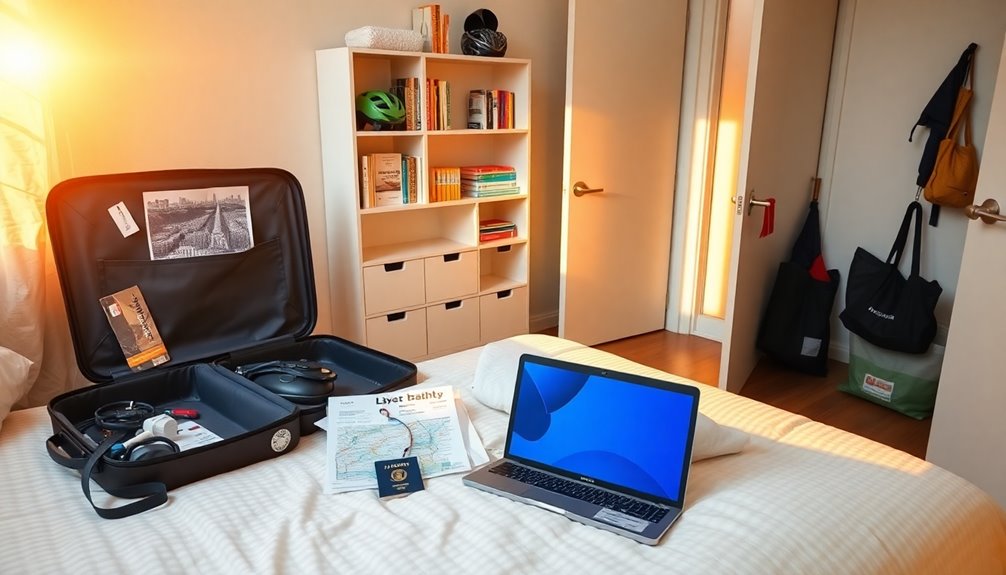
You’ll want to pick a city that fits your vibe and course load, weighing commute, health services and student life. Decide between dorms for security, shared flats for independence, or homestays for cultural immersion. Budget for rent plus utilities, internet and a deposit, and check neighborhood safety, transport and amenities at different times. Get a clear written lease, document the property and know tenant rights. Keep going to see practical checklists and local support options.
Choosing the Right City for English Study in Ireland
Wondering which Irish city fits your English-study goals and lifestyle? You’ll find Dublin culture offers vibrant museums, historic squares, and a broad mix of international students, so it’s easy to connect and feel secure with well-lit streets, reliable transport, and numerous student services. If you prefer a smaller, artsy scene, Galway lifestyle leans toward coastal charm, live music, and close-knit neighborhoods where local businesses know you by name — that can help you feel safer and supported. Think about class size, commute time, and proximity to health and emergency services; those practicalities matter as much as nightlife. Check whether schools run orientation programs, buddy systems, or campus security. Visit neighborhoods after dark if you can, ask current students about their routines, and confirm public-transport schedules. Choose the city that balances your social interests with practical safety and support so you can focus on studying and enjoying Ireland.
Housing Types: Dorms, Shared Flats, and Homestays
Choosing the right housing—whether a dorm, a shared flat, or a homestay—can shape your daily routine, budget, and how quickly you settle into life abroad. You’ll find dorm life offers structured security, easy access to campus resources, and a built-in social circle; check room locks, visitor rules, and staff availability so you feel safe. Shared living gives more independence and cultural exchange with flatmates; clarify cleaning, guest, and quiet-hour agreements before you move in to avoid misunderstandings. A homestay immerses you in local customs and language while providing consistent supervision and often home-cooked meals—confirm privacy expectations and emergency contacts upfront. Consider location, transport links, and house rules for each option, and ask about heating, laundry, and emergency procedures. Trust your instincts during viewings, request references, and use official university or vetted agencies when possible so you can focus on studying and adapting comfortably to your new community.
Budgeting and Hidden Rental Costs to Watch For
Because your rent figure usually only covers the basics, you’ll want to map out the extra costs that commonly surprise international students—utilities that spike in winter, internet setup fees, council tax or garbage levies, security deposits, agency and contract administration fees, and sometimes building insurance or maintenance charges. You should request a written breakdown before you sign so you’re not caught by hidden fees later. Ask whether utilities are capped, how bills are split in shared flats, and who pays for repairs. Include a refundable deposit and a small emergency fund in your budget, and compare agency costs versus private lets. Use simple budgeting strategies: list fixed versus variable costs, set weekly spending limits, and track actual bills for the first three months to adjust forecasts. If language or contract terms feel unclear, get a translator or student support adviser to review documents so you’re protected and feel secure in your housing choice.
Neighborhood Safety, Transport, and Amenities
Once you’ve nailed down the true monthly cost of a place, the next thing to check is the neighborhood itself — safety, transport links and nearby amenities can change daily life as much as rent does. You’ll want to research neighborhood crime stats, talk to current students, and visit at different times — daytime, evening and weekend — to get a real feel. Check how close essential shops, pharmacies and medical centers are, and note lighting on walking routes. Look at public transport options: frequency, night services, and whether a bike lane or shared-scooter scheme offers safe last-mile travel. Consider cultural norms around safety — some areas feel lively and secure in one country but risky in another. If you rely on cash, scope nearby ATMs; if you cook, confirm grocery variety. Trust local student forums and official police pages, and prioritize routes you’d take daily. Choosing a well-connected, low-crime neighborhood makes studying and social life far easier.
Lease Agreements, Tenant Rights, and Deposit Tips
A clear, written lease is your best shield as a student renting abroad, so read every clause and don’t sign until you understand what you’re agreeing to. Check the lease length, notice periods, utilities, and who’s responsible for repairs. Note any house rules about guests, quiet hours, or subletting — these vary by culture and can affect your safety and comfort.
Know your tenant rights locally: registration, inspection rules, and eviction protections differ between countries. Keep copies of IDs, receipts, and correspondence. During lease negotiation, be polite but firm about needed repairs, inventory lists, and clarity on shared responsibility for common areas.
Document the property condition with photos when you move in and out to protect your security deposits. Ask how deposits are held and the timeline for return. If disputes arise, seek local tenant unions or university advisors; they often provide language-specific help and legal referrals to keep you safe and informed.
Practical Move-In Checklist and Local Support Resources

Having a signed lease and documented move-in condition is only the start — now you’ll want a practical checklist to make settling in smooth and to know where to turn if something goes wrong. Start with move in essentials: keys, meter readings, appliance checks, smoke detector and lock function; photograph any damage. Register your address with university and local authorities if required. Set up utilities, Wi‑Fi and basic insurance, and keep receipts.
Locate local services: emergency numbers, nearest hospital or clinic, police station, pharmacy and your embassy or consulate. Save contacts for landlord, property manager, student union, and a trusted local friend or roommate. Learn trash collection rules and public transport routes.
Ask about neighborhood safety norms, quiet hours, and cultural expectations to avoid misunderstandings. Keep digital and paper copies of important documents, and schedule an early follow-up inspection if repairs are needed. This practical approach helps you feel secure and supported from day one.
Some Questions Answered
Can I Work Part-Time on a Student Visa in Ireland?
Yes — you can work part-time on a student visa in Ireland if you meet student visa regulations: typically you’re allowed 20 hours per week during term and full-time during scheduled breaks, but always check your stamp and course level. Look for part time job opportunities like campus roles, hospitality, or tutoring; they’re safe and culturally enriching. Keep permits, tax (PPS) and hours compliant to protect your studies and legal status.
How Do I Transfer Money Internationally Safely and Cheaply?
Like a steady lighthouse in fog, you’ll want reliable providers—use regulated money transfer services (Wise, Revolut, TransferWise alternatives) that show live exchange rates and low fees. Compare providers, lock rates when favorable, confirm recipient details, and enable two-factor authentication for safety. Avoid cash couriers and hidden bank margins; use local currency payouts when sensible. Keep receipts, check transfer limits, and notify your bank of international activity to prevent blocks.
What Mobile Plans and SIM Cards Are Best for Short-Term Students?
You’ll want prepaid options with good local networks and reliable international coverage, so you’re flexible and safe. Pick trusted carriers or airport kiosks, check APN and roaming policies, and compare data caps and top-up methods. Get eSIMs for quick activation if your phone supports them, keep PINs and receipts, and register the SIM where required. That way you avoid surprises, stay reachable, and respect local rules.
Are There Cultural Norms or Etiquette I Should Know Before Arriving?
Funny enough, you’ll notice greeting customs vary wildly, so you’ll probably bump into a handshake, cheek-kiss, or bow depending where you go — be ready and follow their lead. Learn basic polite phrases, respect personal space, and watch cues. Dining etiquette matters: wait to be seated, don’t start until the host invites, and tip or refuse food politely per local norms. That’ll keep you safe and respected.
Can I Bring Prescription Medication and What Documentation Is Required?
Yes — you can usually bring prescription medication, but check prescription rules for your destination first. Carry original packaging, a copy of your prescription and a doctor’s letter explaining medical need and dosage. Research medication customs at your host country — some drugs allowed at home may be controlled abroad. Keep medicines in carry-on, declare them if required, and register with campus health on arrival so you’ll stay safe and compliant.
Summing Everything Up
You’ve got the tools to pick the right city, housing, and budget, and to navigate leases, safety, and move-in tasks — now trust your instincts. Imagine Ana, a Spanish student who chose Galway, booked a homestay for immersion, checked transport links, and read her lease twice before paying the deposit; she felt supported and settled within a week. Stay curious, ask locals, keep copies of documents, and enjoy your Irish student home.
